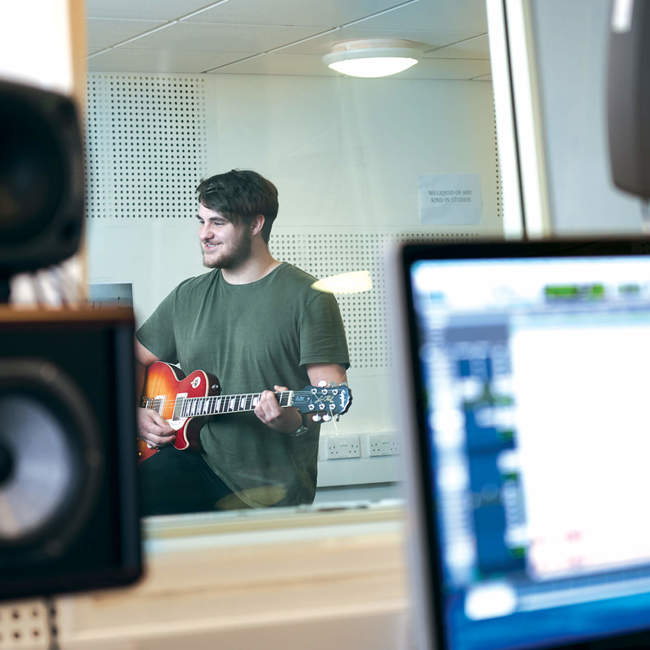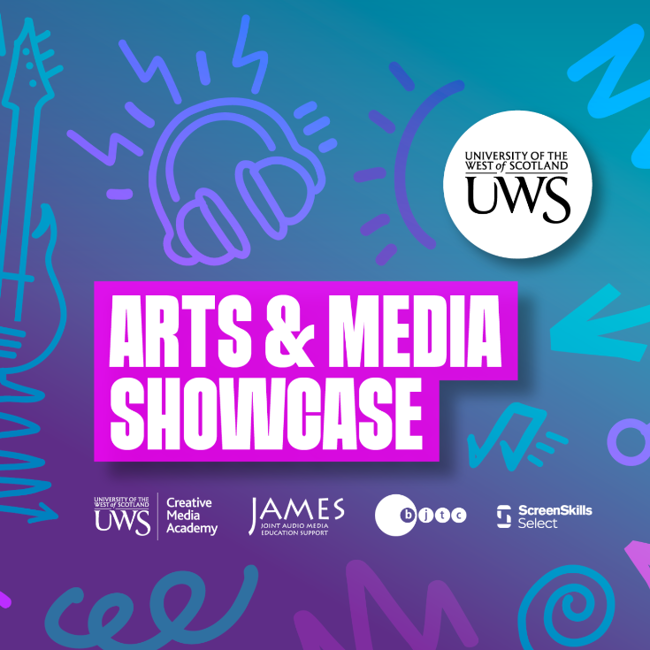Commercial Music
Award
BA (Hons)
Duration & study mode
4 years full-time
School
Business & Creative Industries
Location
Ayr
Additional information
Ucas code
W340
Course starting dates
-
Ayr: September

Clearing opens on Saturday 5th of July 2025.
Get ahead by signing up to our Clearing Priority Pass today!
Janine is a final year student on our BA (Hons) Commercial Music programme at our stunning Ayr campus.
When I first came to UWS, I didn’t realise how technologically advanced the campus was. I just really love how close it is to what you would expect in the industry.”
Janine found her place at UWS – find yours!

The BA (Hons) Commercial Music programme is designed to equip our students and graduates with the skills, knowledge and experience to carve out a career in the ever-evolving commercial music industries.
The programme is organised around Music Industries studies, Songwriting and Performance, Sound Production, and Music and Cultural Research. Whether you’re interested in music promotion, songwriting, teaching, tour management, research, sound engineering or instrumental performance, you’ll be able to plan your pathway through the programme to suit your career aspirations.
Developed and delivered in collaboration with music industry professionals, this programme focuses on contemporary issues in commercial music and the opportunities new media has opened up.
BA Commercial Music is part of the UWS Creative Skillset Media Academy, and is accredited by JAMES (Joint Audio Media Education Support) – an industry accreditation body and recognised Professional and Statutory Regulation Body for music and media education in HE.
We welcome Scottish, UK and international students and consider all applicants on an individual basis.
Please visit our Undergraduate Entry Requirements page for information on our different entry requirements, including country-specific details for EU and non-EU qualifications.
All applicants will be expected to submit a strong personal statement and reference. Applicants may be invited for interview.
For applicants whose first language is not English, the University sets a minimum English Language proficiency level. The qualifications below must have been gained within two years of the start of your course.
General English language requirements at UWS: International English Language Testing System (IELTS) Academic module (not General Training)
Exceptions to this level of IELTS scoring exist for some accredited or professionally-recognised courses (see section below for more details).
SOCIAL WORK DEGREES
For our BA (Hons) Social Work and MSc Social Work programmes, applicants are required to have an IELTS score as follows:
All stated English tests are acceptable for admission for both home/EU and international students for this programme:
For our research degrees (MRes, MPhil, PhD, DBA, DProf) applicants are required to have an IELTS score as follows:
For Health, Nursing & Midwifery courses that lead to, or require professional registration with the Nursing & Midwifery Council, applicants are required to have an IELTS or Occupational English Test (OET)*.
For such courses, the IELTS score is as follows:
* Note that the Occupational English Test (OET) will now be accepted in addition to IELTS as proof of a Nurse's English Language Competence (Nursing & Midwifery Council, 2019).
For our BSc (Hons) Applied Biomedical Science, BSc (Hons) Biomedical Science and MSc Advanced Biomedical Science programmes, applicants are required to have an IELTS score as follows:
For our Certificate of Higher Education courses, applicants are required to have an IELTS score as follows:
TOEFL IBT*: 78; no sub-test less than:
* Please note that TOEFL is still acceptable for admission to this programme for both home/EU and international students.
For international students, the Home Office has confirmed that the University can choose to use TOEFL to make its own assessment of English language ability for visa applications to degree level courses. We therefore still accept TOEFL tests taken in the last two years for admission to this programme.
West African Senior School Certificate of Education (WASSCE) including acceptance of WAEC Scratchcard*
*UWS will accept a WAEC scratchcard confirming that an applicant has achieved C6 or above as evidence of meeting English language requirement from Nigeria if the student graduated within the last 5 years. After 5 years applicants would be required to provide the WAEC Certificate.
Applicants who do not meet the minimum English language requirements have the option to study one of our preparatory and pre-sessional English courses. The UWS courses available are:
BA (Hons) Commercial Music aims to support students in developing their creative practice as performers, producers and composers/songwriters, their understanding of the cultural values and meanings of music, and their knowledge of the structures and revenue streams of the music industries.
Whether you see yourself as a performer, a songwriter, a producer, an aspiring teacher of researcher, or a future music industries professional, the programme seeks to help you expand your skills, knowledge and experience across key areas of the music industries in the UK and beyond.
Based on our Ayr campus, the learning and teaching on the programme is organised around core strands and concepts relating to the modern music industries, focusing on Music Industries studies, Songwriting and Performance, Sound Production, and Music and Cultural Research. You will work with UWS staff and visiting lecturers, who are themselves practicing music industry professionals, and you'll make key contacts across the music industry.
Introduction to the theory and practice of music performance, production, business and cultural theory. First year offers you the opportunity to broaden your scope and investigate theatres of music you may not previously have considered.
Focus on your chosen specialism of performance, production, business or theory while developing your understanding of media theory and intellectual property. Second year allows you to experience several key sectors of the professional music industries.
Deepen your engagement with your specialist area of study, completing a major self-directed project. You may also undertake work-related learning within the industry which is an ideal entry point for future employment.
Complete a Creative Research Project in which you either research and write a 10,000-word dissertation, OR develop and implement a major piece of music-based creative practice work. Mentoring and careers planning activities help you to develop your action plan for employment upon graduating.
BA (Hons) Commercial Music is designed for student success by promoting creativity, autonomy and employability both in terms of module content and course structure. We offer inspirational and transformative learning within a flexible and personalised curriculum. This is based on a model of research and experiential learning, with a mix of practical, project-based work and critical analysis of contemporary popular music culture and the global music industries.

Our graduates hold jobs in almost every corner of the music industries in Scotland and beyond, holding positions such as record company personnel, teachers, promoters, music marketing and PR specialists, tour managers, sound engineers, music lecturers, producers and performing and recording artists.
Many of our graduates choose to go on to further study, leading to an MA, MSc, PhD or teaching qualification. For students seeking to extend their studies at UWS, we offer Masters qualifications in MA Music, MA Songwriting and Performance, MA Sound Production and MA Music Industries.

In May 2024, we celebrated the creative endeavours of UWS students at our annual showcase and awards event on our beautiful Ayr campus.
The event boasted film screenings, broadcast production work, live music performances, art exhibition displays, theatre productions, songwriters’ circle and news-room journalism material. Elements of the event were also broadcast via UWS Radio.
You can now view the Commercial Music digital showcase to see the types of opportunities available to our students as part of their BA Commercial Music degree with UWS.
£1,820 cost per year of study (usually paid by the Scottish Government via SAAS*)
£9,250 Cost per year of study, but not more than £27,750
£9,250 Cost per year of study, but not more than £27,750
£15,500 per year of study
£305 per module (20 credits)
£1,550 per module (20 credits)
£1,550 per module (20 credits)
£2,580 per module (20 credits)
£1,820 cost per year of study (usually paid by the Scottish Government via SAAS*)
£9,535 per year of study (4 years of study for the price of 3 years)
£9,535 per year of study (4 years of study for the price of 3 years)
£15,500 per year of study
£305 per module (20 credits)
£1,590 per module (20 credits)
£1,590 per module (20 credits)
£2,580 per module (20 credits)
Ready to apply? All UK & EU undergraduate applications should be made through UCAS. Further information for international, part-time and exchange applications can be found below.
UCASClearing runs from 5 July through to 20 October. Spaces are limited, therefore we encourage application as soon as possible.
If you are using Clearing to apply for University for the first time, you’ll need to register with UCAS and submit an application.
Find out more about applying through Clearing.
A small number of courses will require applications to be made directly to UWS. This will be noted where required.
Please refer to our Undergraduate Application Guide for domestic & EU/EEA .
For applications and more information on applying, please visit www.ucas.com
Students from non-EU/non-EEA countries can apply directly to UWS via our dedicated online application system. The latest we can process your application is 6 weeks before the course start date to allow for visa processing times. For more information on when and how to apply to study at UWS please refer to our International Undergraduate Application Guide.
For part-time & online study, you should apply directly to the University through our online application system, not through UCAS. Please select the part-time mode of study when submitting your application. Before you begin your application, it is important to read the part-time application step-by-step guide for a smooth process.
To come to UWS as a visiting student on a study abroad or exchange programme, you must apply entirely through our online system.
An ATAS certificate is not required for overseas students applying for this course.
Got your results and ready to apply?
Complete our Clearing Application form
Waiting for results?
Sign up to our Clearing Priority Pass
You can also phone us on 0800 027 100
We will always try to make sure that we publish accurate course information but we do not accept responsibility for any mistakes or omissions. We will also try to make sure that we deliver our courses in line with our published information. However, we may not always be able to do so and you can find further information about this in our enrolment terms and conditions.